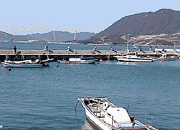 Blue Lemons.
Blue Lemons.Iwagi is well known throughout the local area for its special breed of lemons: "Aoi Remon" or "Blue Lemons", from which the island gets its nickname "Aoi Remon no Jima" (Blue Lemon Island)D The lemons themselves are shaped like regular yellow lemons, but are green in colour. This leads many to believe they are limesC but the taste is actually quite different. Also, it is interesting to note that the Japanese often refer to the colour green as "aoi", the Japanese word for blue. The word for green is infact "midori". 

 The blue lemons were originally bred on Iwagi, and are sold not only in their natural state, but in many other locally famed products: blue lemon jelly, jam, butter and of course, juice. A factory which produces some of these items is located on the north side of the island. You can also enjoy most at the Lemon Heart Cafe.  Imogashi.
Imogashi.Roughly translated, "imogashi" are potato sweets. Like blue lemons, imogashi are produced on the island, in a small factory by the main port. Shaped like french fried potato chips, imogashi are deep fried until crisp, and have a very sweet, sugary flavour. Most visitors to Iwagi go home with a bag or two of imogashi as a souveneir.
The official fruit of Ehime Prefecture is the "mikan" or manderin orange. It was perhaps decided upon as the official fruit for its sheer abundance throughout the prefecture's various farming communities, and Iwagi too, has its fair share. In the right season, which is around October/November, trees on the hillsides are dotted with orange, and trucks filled to the brim can be spotted at the port waiting to transport the mikans to market by vehicular ferry. Mikans are a very popular, not to mention healthy, snack for adults and children alike. On Iwagi, they are often included in the school lunches, which are issued at the primary and junior high schools each weekday. Mikans are also availble in preserved form, as well as bottled juice, which I have heard referred to as "liquid sunshine".
As Iwagi is an island, it should come as no surprise to hear that the diet of locals is largely seafood based. The people of Iwagi Jima are proud to proclaim the seafood caught in the surrounding waters is the best in Japan. Many other Seto Inland Sea island communities make the same claim, thus it falls to the visitor to form their own opinion through taste testing. Fishing boats depart and return daily, delivering fresh seafood to Iwagi's restaurants. |
HOME



